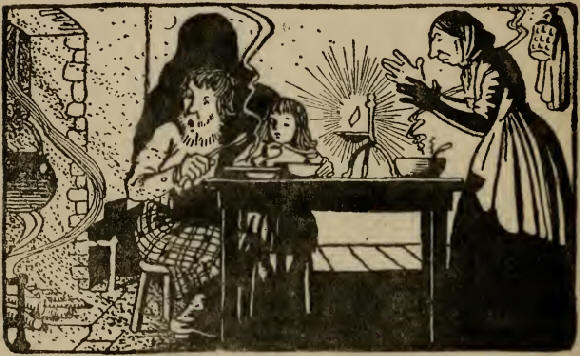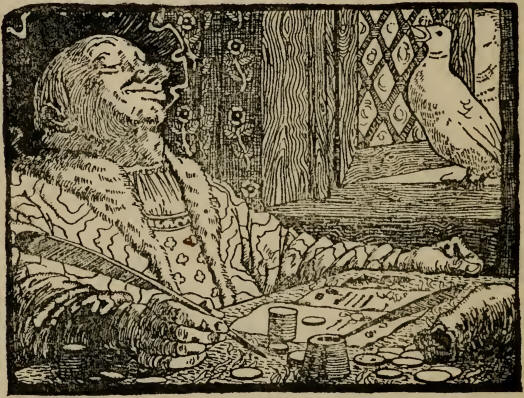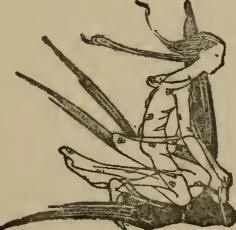|
There was once a man
who got his living by working in the fields. He had one little son,
called Curly-Locks, and one little daughter, called Golden-Tresses;
but his wife was dead, and, as he had to be out all day, these
children were often left alone. So, as he was afraid that some evil
might befall them when there was no one to look after them, he, in
an ill day, married again.
I say, “in an ill day,” for his second wife was a most deceitful
woman, who really hated children, although she pretended, before her
marriage, to love them. And she was so unkind to them, and made the
house so uncomfortable with her bad temper, that her poor husband
often sighed to himself, and wished that he had let well alone, and
remained a widower.
But it was no use crying over spilt milk; the deed was done, and he
had just to try to make the best of it. So things went on for
several years, until the children were beginning to run about the
doors and play by themselves.
Then one day the Goodman chanced to catch a hare, and he brought it
home and gave it to his wife to cook for the dinner.
Now his wife was a very good cook, and she made the hare into a pot
of delicious- soup; but she was also very greedy, and while the soup
was boiling she tasted it, and tasted it, till at last she
discovered that it was almost gone. Then she was in a fine state of
mind, for she knew that her husband would soon be coming home for
his dinner, and that she would have nothing to set before him.
So what do you think the wicked woman did? She went out to the door,
where her little step-son, Curly Locks, was playing in the sun, and
told him to come in and get his face washed. And while she was
washing his face, she struck him on the head with a hammer and
stunned him, and popped him into the pot to make soup for his
father’s dinner.
By and by the Goodman came in from his work, and the soup was dished
up; and he, and his wife, and his little daughter, Golden-Tresses,
sat down to sup it.
“Where’s Curly-Locks?” asked the Goodman. “It’s a pity he is not
here as long as the soup is hot.”
“How should I ken?” answered his wife crossly. “I have other work to
do than to run about after a mischievous laddie all the morning.”
The Goodman went on supping his soup in silence for some minutes;
then he lifted up a little foot in his spoon.

“This is Curly-Locks’
foot,” he cried in horror. Thero hath been ill work here.”
“Hoots, havers,” answered his wife, laughing, pretending to be very
much amused. “What should Curly-Locks’ foot be doing in the soup?
’Tis the hare’s forefoot, which is very like that of a bairn.”
But presently the Goodman tooK something else up in his spoon.
“This is Curly-Locks’ hand,” he said shrilly. “I ken it by the crook
in its little finger.”
“The man’s demented,” retorted his wife. “not to ken the hind foot
of a hare when he sees it!”
So the poor father did not say any more, but went away out to his
work, sorely perplexed in his mind; while his little daughter,
Golden-Tresses, who had a shrewd suspicion of what had happened,
gathered all the bones from the empty plates, and, carrying them
away in her apron, buried them beneath a flat stone, close by a
white rose tree that grew by the cottage door.
And, lo and behold! those poor bones, which she buried with such
care:
“Grew and grew,
To 'a milk-white Doo,
That took its wings,
And away it flew.”
And at last it lighted on a tuft of grass by a burnside, where two
women were, washing clothes. It sat there cooing to itself for some
time; then it sang this song softly to them:
“Pew, pew,
My mimmie me slew,
My daddy me chew,
My sister gathered my banes,
And put them between two milk-white stanes.
And I grew and grew
To a milk-white Doo,
And I took to my wings and away I flew.”
The women stopped washing and looked at one another in astonishment.
It was not every day that they ^came across a bird that could sing a
song like that, and they felt that there was something not canny
about it.
“Sing that song again, my bonnie bird,” said one of them at last,
“and we’ll give thee all these clothes!”
So the bird sang its song over again, and the washerwomen gave it
all the clothes, and it tucked them under its right wing, and flew
on.
Presently it came to a house where all the windows were open, and it
perched on one of the window-sills, and inside it saw a man counting
out a great heap of silver.
And, sitting on the window-sill, it sang its song to him:

“Pew, pew,
My mi ramie me slew,
My daddy me chew,
My sister gathered my banes,
And put them between two milk-white stanes.
And I grew and grew
To a milk-white Doo,
And I took to my wings and away I flew.”
The man stopped counting his silver, and listened. He felt, like the
washerwomen, that there was something not canny about this Doo. When
it had finished its song, he said:
“Sing that song again, my bonnie bird, and I’ll give thee a’ this
siller in a bag.”
So the Doo sang its song over again, and got the bag of silver,
which it tucked under its left wing. Then it flew on.
It had not flown very far, however, before it came to a mill where
two millers were grinding corn. And it settled down on a sack of
meal and sang its song to them.
“Pew, pew,
My mimmie me slew,
My daddy me chew,
My sister gathered my banes,
And put them between two milk-white stanea.
And I grew and grew
To a milk-white Doo,
And I took to my wings and away I flew.”
The millers stopped their work, and looked at one another,
scratching their heads in amazement.
“Sing that song over again, my bonnie bird!” exclaimed both of them
together when the Doo had finished, “and we will give thee this
millstone.”
So the Doo repeated its song, and got the millstone, which it asked
one of the millers to lift on its back; then it flew out of the
mill, and up the valley, leaving the two men staring after it dumb
with astonishment.
As you may think, the Milk-White Doo had a heavy load to carry, but
it went bravely on till it came within sight of its father’s
cottage, and lighted down at last on the thatched roof.
Then it laid its burdens on the thatch, and, flying down to the
courtyard, picked up a number of little chuckie stones. With them in
its beak it flew back to the roof, and began to throw them down the
chimney.
By this time it was evening, and the Goodman and his wife, and his
little daughter, Golden-Tresses, were sitting round the table eating
their supper. And you may be sure that they were all very much
startled when the stones came rattling down the chimney, bringing
such a cloud of soot with them that they were like to be smothered.
They all jumped up from their chairs, and ran outside to see what
the matter was.
And Golden-Tresses, being the littlest, ran the fastest, and when
she came out at the door the Milk-White Doo flung the bundle of
clothes down at her feet.
And the father came out next, and the Milk-White Doo flung the bag
of silver down at his feet.
But the wicked step-mother, being somewhat stout, came out last, and
the Milk-White Doo threw the millstone right down on her head and
killed her.
Then it spread its wings and flew away, and has never been seen
again; but it had made the Goodman and his daughter rich for life,
and it had rid them of the cruel stepmother, so that they lived in
peace and plenty for the remainder of their days.

|

